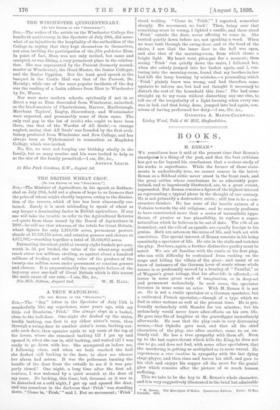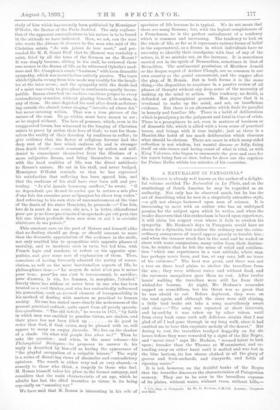BOOKS.
M. RENAN.* WE sometimes hear it said at the present time that Renan's standpoint is a thing of the past, and that the best criticism has got so far beyond his conclusions that a serious study of his works is superfluous. While the former of these state- ments is undoubtedly true, we cannot concur in the latter. Renan as a Biblical critic never stood in the front rank, and the great critics whose conclusions he so admirably popu- larised, and so ingeniously illustrated, are, to a great extent, superseded. But Renan remains a figure of the highest interest as representing a typical phase in the thought of our century. He is not primarily a destructive critic ; still less is he a con- structive thinker. He has none of the hostile animus of a Voltaire towards the old religions ; and he scarcely professes to have constructed more than a series of naturalistic hypo- theses, of greater or less plausibility, to replace a super- naturalism which he believes to be out of date. The role of an iconoclast, and the role of an apostle, are equally foreign to hie genius. Both are actors on the scene of life, and both act with conviction. The special interest of Renan consists in his being essentially a spectator of life. He sits in the stalls and watches the play. But here, again, a further distinctive quality must be noted. We are all familiar with the rustic at his first play, who can with difficulty be restrained from rushing on the stage and killing the villain of the piece : and many of us, know of instances of the German lover of music whose whole nature is so profoundly moved by a hearing of " Parsifal," or of Wagner's great trilogy, that his after-life is affected ;—it, issues in some great work of imagination, or in deep-set and permanent melancholy. In such cases, the spectator becomes in some sense an actor. With M. Renan it is not so. He is not a rustic spectator or a German spectator, but a cultivated French spectator,—though of a type which we find in other nations as well at the present time. He is pro- - foundly melancholy with Hamlet for ten minutes; but his melancholy would never leave after-effects on his own life. He goes into fits of laughter at the gravedigger immediately afterwards. He sees that the play ends in very distressing scenes,—that Ophelia goes mad, and that all the chief characters of the play, one after another, come to an un- timely end. He has a true sympathy with them all. Even up to the last rapier-thrust which kills the King, he does not rise to go, and does not feel, with some other spectators, that the murdering is getting so multiplied as to seem unreal. He experiences a vise emotion in sympathy with the last dying stage-player, and then rises and leaves his stall, and goes to his club and enjoys his supper all the more for the genial glow which remains after the picture of so much human.. suffering.
This we take to be the key to M. Renan's whole character, and it is very suggestively illustrated in the brief but admirable
* 11. Reran. Par Monsignor D'Huld. Quatrir3mo idition. Paris 15 RUG Cassette. 1693.
study of him which has recently been published by Monsignor D'Hulst, the Rector of the Paris Rstitast. The only explana- tion of the apparent contradictions in his nature is to be found in the attitude we have indicated. How, we ask, can the man who wrote the Abbesse cle Jouarrc be the man who said of the Christian saints, " Je suis jaloux de leur most," and per- suaded Sir M. E. Grant Duff that he (Renan) was veritably a saint, tried by all the tests of the Sermon on the Mount P It was simply because, sitting in his stall, he reviewed these two scenes in the drama of life, as he witnessed Ophelia's mad- ness and Mr. Compton's comic " business," with keen dramatic sympathy, which was nevertheless entirely passive. The tears which Ophelia wrung from him made way readily for the laugh- ter at the later scene ; and the sympathy with the death-bed of a saint was ready to give place to sentiments equally incom- patible. Renan absorbed the surface-emotions proper to every contradictory situation, without placing himself, in action, in any of them. He once depicted his soul after death as flutter- ing outside the church tower singing " introibo ad altare dei," but never entering within. That was a true picture of the nature of the man. To go within must have meant to act ; so he stayed without. The love of penance, which, even in its exaggerated forms, has witnessed to the longing of Christian saints to prove by action their love of God; to test for them- selves the reality of their devotion by readiness to suffer ; to give evidence that the flower of religious fervour had the deep root of the love which endures all, and is stronger than death itself ;—such constant effort by action and self- denial to emancipate themselves from the illusions of a mere subjective dream, and bring themselves in contact with the hard realities of life, was the direct antithesis to Renan's nature. He sat in his stall, and never budged. Monsignor D'Hulst reminds us that he has expressed his satisfaction that suffering has been spared him, and that the cushions of his stall have ever been soft and pro-
tecting. " Je jamais beaucoup souffert," he wrote. "11 ne dependrait que de moi de eroire que la nature a mis plus d'une fois des coussins pour m'opargner les chocs trop saes." And referring to his own state of unconsciousness at the time of the death of his sister Henriette, he proceeds :—" Une fois, lore de la mart de ma Rmar, elle m'a, h la lettre, chloroform6 pour que je ne fusee pals temoin Wan spectacle qui ellt peutahre fait une lesion profonde dans Ines sons et nui ii la s6renito ult6rieure de ma pens6e."
This constant care on the part of Nature and himself alike that no feeling should go deep, or should amount to more than the dramatic appreciation of the audience in the stalls, not only enabled him to sympathise with opposite phases of morality, and to inculcate each in turn, but led him, with French logic and candour, to reflect on his opposite sym- pathies, and give some sort of explanation of them. Thus, conscious of having fervently admired the poetry of renun- ciation, as well as the more bacchanalian aspects of life, he philosophises thus :—" Le moyen de salut n'est pas le memo pour tons : pour' les une c'est le renoncement, le sacrifice ; pour d'antres, le yin, les femmes, la morphine, Palcohol." Surely there has seldom or never been in one who has been treated as a real thinker, and who has undoubtedly influenced his generation, such an avowed element of irresponsibility in his method of dealing with matters so practical to human society. No one has stated more clearly the seriousness of the present practical outlook, quite apart from all purely specula- tive questions. " The old beliefs," he wrote in 1871, "by faith in which man was enabled to practise virtue, are shaken, and
their place has not been filled up to do good in order that God, if God exists, may be pleased with us, will appear to many an empty formula. We live on the shadow of a shade. On what will people live after us P" Thus he asks the question : and when, in the same volume—his Philosophical Dialogues—he proposes to answer it, his reply is described by himself as having the appearance of "the playful occupation of a culpable leisure." The reply is a series of dissolving views of dissimilar and contradictory opinions. The result is either very sad or very absurd,—a comedy to those who think, a tragedy to those who feel. M. Renan himself takes his place in the former category, and considers that the main characteristic of an age, which he admits has lost the chief incentive to virtue is its being especially an " amusing age."
We have said that M. Renan is interesting in his rule of spectator of life because he is typical. We do not mean that there are many Renans ; but, with the logical completeness of a Frenchman, he is the perfect embodiment of a tendency which is common and increasing. The tendency to look on the whole of life, so far as it represents various forms of belief in the supernatural, as a drama in which individuals have no necessity to identify their standpoint with that of any of the actors, is, if we mistake not, on the increase. It is sometimes carried out in the spirit of Democritus, sometimes in that of Heraclitus. The sentimental pessimism of Matthew Arnold or the deeper regret of Arthur Clough, are as common in our own country as the genial amusement, and the supper after the play, of M. Renan. But in both forms it is the same thing,—the disposition to acquiesce in a passive review of all phases of thought without any deep sense of the necessity of making up the mind to action. This tendency, no doubt, is defended on philosophical grounds. Men argue that it is irrational to make up the mind, and act, on insufficient evidence. But there is an alternative which finds its parallel in homely and familiar life. There is a habit of deliberation which is paralysing to the judgment and fatal in time of crisis. There is a promptness to act, even in matters of business or of domestic life, which is allied with a keen sense of practical issues, and brings with it true insight; just as there is a Hamlet-like habit of too much deliberation which obscures what should be obvious. There are cases in which many-sided reflection is not wisdom, but mental disease or folly, fixing itself on side-issues and losing count of what is vital, as with King Valoroso, who began to enumerate the pros and cons for his watch being fast or slow, before he drew out the reprieve for Prince Bulbo within ten minutes of his execution.



































 Previous page
Previous page